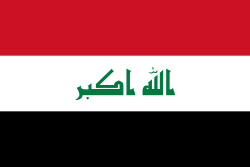| UN Security Council Resolution 1956 | ||
|---|---|---|
 | ||
| Date | 15 December 2010 | |
| Meeting no. | 6,450 | |
| Code | S/RES/1956 (Document) | |
| Subject | The situation concerning Iraq | |
Voting summary |
| |
| Result | Adopted | |
| Security Council composition | ||
Permanent members | ||
Non-permanent members | ||
| ||
United Nations Security Council Resolution 1956, adopted unanimously on December 15, 2010, after recognising positive developments in Iraq since the adoption of 661 (1990), the Council terminated UN supervised arrangements for the Development Fund for Iraq with effect from June 30, 2011. [1]
Contents
Resolution 1956, along with resolutions 1957 (2010) and 1958 (2010), ended some major restrictions placed on Iraq. However, demands that Iraq resolve disputes with Kuwait remained. [2] The high-level meeting was chaired by United States Vice President Joe Biden. [3]